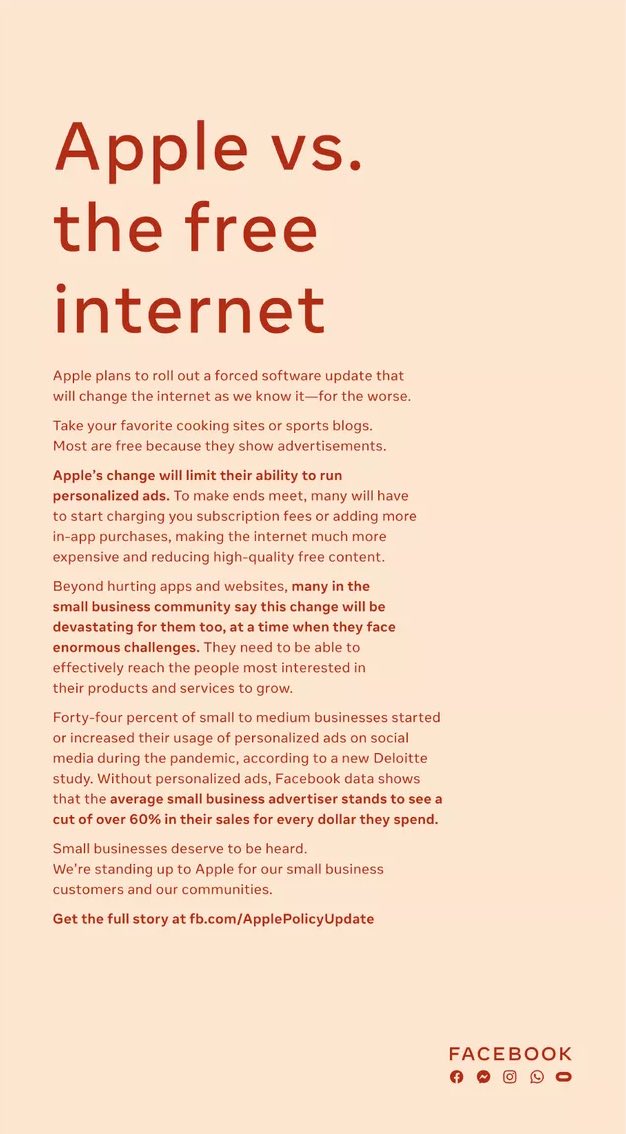Less than 24 hours after it ran anti-Apple advertisements in the New York Times, Wall Street Journal and Washington Post newspapers in the United States, Facebook has now bought more full-page ads in an effort to have the general public support its stance on ad tracking.
The first ad criticized Apple’s plan to restrict some data gathering with the latest iOS and iPadOS 14 updates, arguing that these changes are bad for small businesses. The key message was that “limiting how personalized ads can be used impacts larger companies like us” while noting that these changes will be particularly “devastating to small businesses.”
Those ads included Facebook’s internal research claiming ads delivered without personalized targeting generate 60 percent fewer sales than ads that do target consumers via tracking. The second full-page ad that appeared today in the same three newspapers as the first ad escalates Facebook’s messaging, suggesting that the new ad-tracking features in iOS 14 will harm the Internet because Apple supposedly wants to “stop the Internet from being free”.

Here’s the full copy.
Apple vs. the free internet
Apple plans to roll out a forced software update that will change the internet as we know it—for the worse.
Take your favorite cooking sites or sports blogs. Most are free because they show advertisements.
Apple’s change will limit their ability to run personalized ads. To make ends meet, many will have to start charging you subscription fees or adding more in-app purchases, making the Internet much more expensive and reducing high-quality free content.
Beyond hurting apps and websites, many in the small business community say this change will be devastating for them too, at a time when they face enormous challenges. They need to be able to effectively reach the people most interested in their products and services to grow.
Forty-four percent of small to medium businesses started or increased their usage of personalized ads on social media during the pandemic, according to a new Deloitte
study. Without personalized ads, Facebook data shows that the average small business advertiser stands to see a cut of over 60% in their sales for every dollar they spend.Small businesses deserve to be heard. We’re standing up to Apple for our small business customers and our communities.
The ad campaign continues on the web, linking to Facebook’s “Speak Up For Small Business” webpage where the company presents its case and provides a bunch of videos from small business owners who explain why they’re worried about the change.
The king of privacy theft, @Facebook, is running ads attacking @Apple, the leader in privacy protection. All because Apple is shifting to an opt-in system from an opt-out system for users to allow data sharing with advertisers. FB must fear folks won’t opt in. I wonder why.
— Walt Mossberg (@waltmossberg) December 16, 2020
In short, iOS and iPadOS 14 introduce privacy changes making it more difficult for companies like Facebook to target users with ads. In a nutshell, developers and ad companies are now required to use Apple’s new Identifier for Advertisers to track customers across apps and websites. Basically, ad tracking went from being an opt-out feature in iOS 14 to an opt-in. In other words, people now must specifically agree and enable ad and cross-site tracking.
That feeling when a video is needed to show how long you have to scroll just to see all the ways Facebook is tracking us 🤔https://t.co/AhyTjwxxwa
— iDownloadBlog (@iDownloadBlog) December 17, 2020
Facebook said yesterday:
We disagree with Apple’s approach and solution, yet we have no choice but to show Apple’s prompt. If we don’t, they will block Facebook from the App Store, which would only further harm the people and businesses that rely on our services. We cannot take this risk on behalf of the millions of businesses who use our platform to grow.
Apple responded by saying:
We believe that this is a simple matter of standing up for our users. Users should know when their data is being collected and shared across other apps and websites — and they should have the choice to allow that or not. App Tracking Transparency in iOS 14 does not require Facebook to change its approach to tracking users and creating targeted advertising, it simply requires they give users a choice.
I think Daring Fireball’s John Gruber correctly observed that Facebook’s newspaper ad appears to have an interesting target audience (based on the NYT, WSJ and Washington Post audiences): old white politicians.